Christian Zacharias has been playing and recording Scarlatti for his entire career, and you want to love him for it, but he doesn’t always make it easy. His previous outings in this repertoire, for EMI, had an energy and idiomatic spunk largely lacking in the artist of today. Zacharias’ current love of tempo rubato produces some fascinating results, as in K. 126 which sounds amazingly like Chopin in places, or the shimmering impressionistic harmonies created by some imaginative pedaling throughout the recital. And when Zacharias finally does decide to give us a real fortissimo, as in K. 518, the shock is tremendously enlivening. So don’t get me wrong, there’s truly some exquisite playing here: Zacharias manages the successive entries of K. 384’s rising principal theme with consummate poetry, the musical equivalent of a flower gradually opening.
But all of this elegance and delicacy of feeling runs smack up against two annoying mannerisms: first, a tendency to hesitate both on the highest note of any melodic curve and immediately preceding successive sequential entries of a theme (and there are a lot of those!); second, a fetish for feminine endings that dissipates the energy of even the most rambunctious sections. Compare, for example, the way Zacharias breaks the musical line in K. 519, as opposed to Pletnev (Virgin), who uses a wider range of dynamics and accents to propel the sonata’s rising sequences forward while keeping the tempo steady. Zacharias also places the two longest sonatas, K. 402 and K. 206 (both over 8 minutes) at the very end of the program, making for a comparatively droopy second half to his recital–despite a more crisply dispatched K. 202, which concludes the disc.
MDG’s generally fine sonics tend to emphasize the piano’s treble more than is necessary, though this partly may be a function of what sounds like a bias toward the right hand on the part of Zacharias himself. So while there’s certainly some beautiful playing as such going on here, it simply doesn’t achieve the level of Horowitz, Pletnev, or even the younger Zacharias. Like his recent, disappointing Schumann Concerto, he seems to be indulging a penchant for self-conscious reverie to the detriment of the music. This isn’t awful, but it is predictable, and that’s not generally what we want to hear in Scarlatti.
































